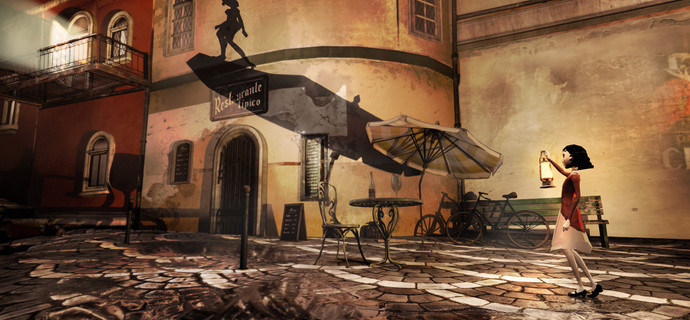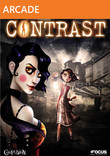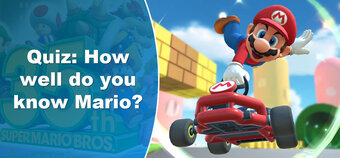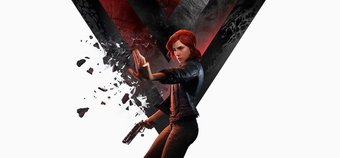Embarrassing admission time - if you'd said 'Vaudevillian' to us before we started playing Contrast, we'd have assumed you were just talking about some bad guy called 'Vaud'. But what may not be the most obvious theming term (at least if you're seemingly as uncultured by us) actually describes the 1930s theatrical stylings of the puzzle/platform game, Contrast.
Set amongst the shadier parts of Paris (literally), Contrast tells the story of a young girl named Didi, who comes from a broken home. Having been told her Dad walked out and left both her, and her mom to cope for themselves, Didi spends a lot of time at home alone, as her mom works nights as a singer in a cabaret bar. Luckily for her, Didi has an imaginary friend to keep her company, in the shape of Dawn, a leggy, and oddly silent acrobat that has a special power. By virtue of her imaginary-ness, not only can Dawn not be seen by anyone else, but she can also switch between Didi's world (the "real" world), and the world of shadows at any time. Stand next to an illuminated wall, and Dawn can turn into a 2D shadow at the touch of a button, making use of the projected silhouettes to reach areas that normal humans never could.
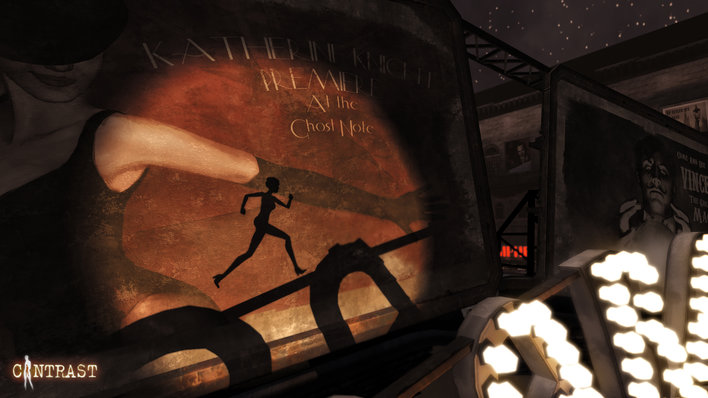
Lurking in the shadows
And it's this idea that provides the meat for the majority of the puzzles Contrast throws your way. Mixing platforming with the mind-bending ability to switch to a 2D form, and make platforms out of shadows adds, if you'll excuse the terrible pun, an extra dimension that means you have to think everything over several times.
The most basic puzzles simply revolve around deciding when to switch in and out of shadow to reach your goal. One of the earliest ones in the game asks you to reach a high up balcony - all you have to do is jump next to the wall, and switch at the right moment to hitch a ride on the silhouette of a bike's pedal. Left upside down next to a lamp, with its pedals slowly (and oddly, perpetually) rotating, the peddles essentially form a gigantic shadow lift, which can take you where you need to go.
As you'd likely expect, the puzzles get a lot harder from here on in. Whether it's more complex variations on the first puzzle that involve switching into the real world, then back into shadow to jump past a gap, or something altogether more complex in design, there's plenty of head scratchers here that involve a very specific way of thinking if you want to get past them. In fact, some of the most complex involve you having to set up the shadow walkways you'll be making use of on your own, by shifting objects around near the appropriate light sources.
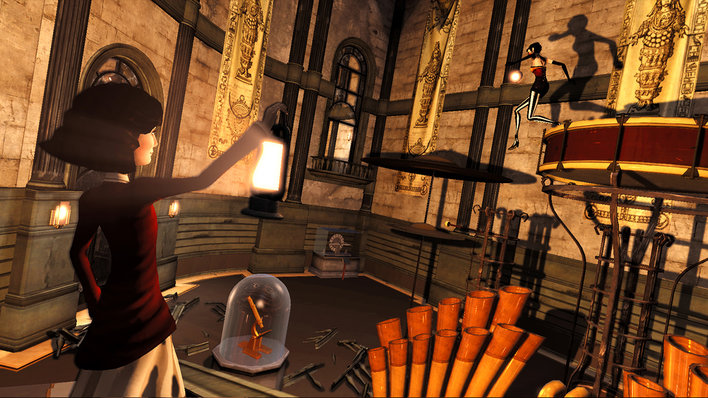
It's here, in the observatory, that the puzzles really start to get tricky.
It may sound easy when you write it on paper, but in the game, it's a lot trickier than you'd expect. Essentially presented with a blank canvas, it's up to you to figure out how to arrange the objects you've got with the light sources you've got to make something that can get you where you need to be. Only problem is, you have no idea what that is, or what the 'right' way of doing it is - if there even is a right way! It's a challenge of trial and error to say the least, but there's a great sense of satisfaction when you finally figure it out for yourself.
Of course, things aren't as easy as just sliding some props around and hoping for the best. If you want to make use of the light sources, you'll have to set them up first - and that means hunting down some collectables. Scattered throughout each of the levels are luminaries - by which they mean lights, not intelligent people - which you can collect, if you can figure out how to reach them. Find enough, and slot them into the light sources, and you'll be able to progress through your adventure. Essentially making barriers you can't get past until you've explored, and collected enough, this is a nice touch to make Contrast last that little bit longer, as even with head-scratching time, this is still a short game.
It's also an incredibly creative one, and one you'll by dying for more of. There are some great moments in here - like the 'puppet show' you can create at the Circus, using Dawn as the helpful shadow puppet, which essentially turns the game into a 2D, monochrome platformer - like Limbo, but good - while the pirate ride, another part of the circus that you need to put back together by shifting blocks, rotating platforms, and lifting bridges is another great section, with some inventive puzzles waiting to be solved. One of the genius twists is that you can actually take objects into the shadow world with you, which is great for moving crates from A to B. While you can't chuck objects, or jump with them in the real world, one of the later puzzles sees you switching into shadow mode to dump a box, before moving back into the real world and taking control of the light itself, moving the light to move the box around the world. It's incredibly clever - but at times, it seems to push things that little bit too far.
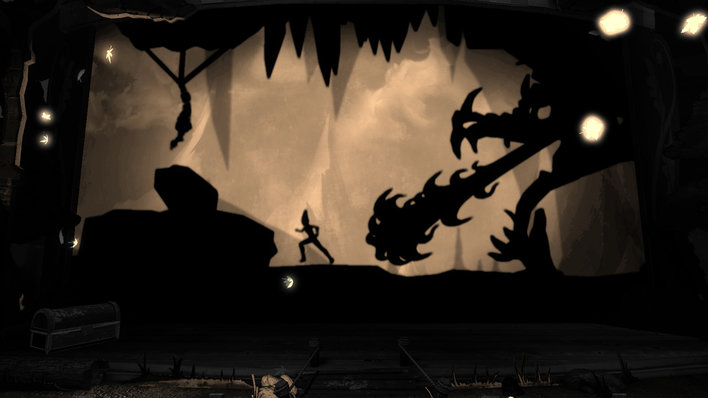
A pointy hat, a dashing prince that needs rescuing, and a dragon. This game has everything.
Some puzzles seem to be so clever, they actually break the game's internal logic. Puzzles involving corners and glass walls are particularly troublesome, as the camera seems to really struggle tracking you, either breaking, or rotating madly, before stopping in some ungodly position, which in turns means the controls don't work as they should. It's a bit annoying that when the game detects you've been 'squashed', or basically have less room than you really need in the shadow world, it pops you back out into the real world. The problem is, it's not as lenient as we'd like, so gaps you think you can make end up being trips back to the real world.
The story, too, isn't quite as good as it really should have been. To begin with, the narrative fires on all cylinders, with a moving story of a broken home, and some event that caused Didi's mom to chuck her husband out. Important plot points are played out through silhouettes on the walls, triggered when Dawn walks over a record player, as you 'relieve' certain events, which sometimes even change if Didi's around. However, the ending seems to be cobbled together, with a pay-off that doesn't really answer any of the questions about Didi, Dawn, or the bizarre world they inhabit, yet alone why Didi's mom seems so irrational in the first place.
Still, these are all fairly minor complaints when stacked against everything Contrast pulls off. With an inventive setting, some great puzzles, and an original use of light and shadow, this is a game that feels different to anything that's come before it - and when the credits roll, you'll be left wishing this had had that extra bit of investment so it could be turned into a proper, full blown release, that's about four times as long. Here's hoping for a sequel.
Format Reviewed: Xbox 360

